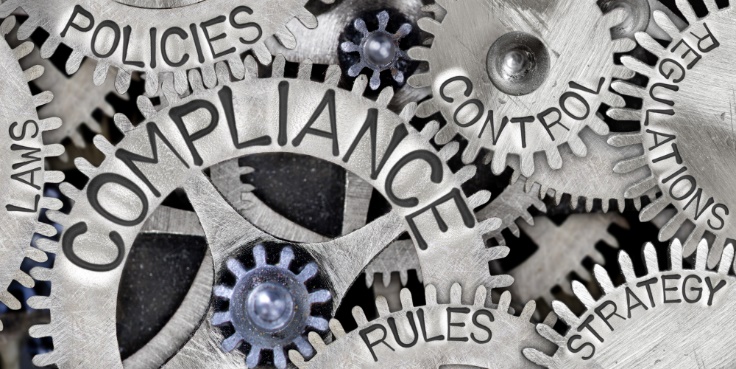If you think starting a business is as simple as hanging a shingle outside your door, you are sorely mistaken. Not only does launching a startup require thousand upon thousands of dollars, but several agencies demand tons of paperwork to ensure you are doing your utmost to protect your clients, your service providers and yourself.  In a rush to get to market, many startups ignore the critical step of becoming compliant. This is a grievous mistake: Not only does non-compliance often register your business incapable of entering the market, but it also often makes you vulnerable to cyber attack and results in significant losses of money, reputation and time. Compliance mistakes come in all shapes and sizes. This guide will help you identify any compliance issues with your budding business, so you can avoid the consequences of non-compliance.
In a rush to get to market, many startups ignore the critical step of becoming compliant. This is a grievous mistake: Not only does non-compliance often register your business incapable of entering the market, but it also often makes you vulnerable to cyber attack and results in significant losses of money, reputation and time. Compliance mistakes come in all shapes and sizes. This guide will help you identify any compliance issues with your budding business, so you can avoid the consequences of non-compliance.
-
Placing Compliance as a Low Priority
Your first priority is making money, and your second priority is growth. These don’t have to change, but somewhere in your list of top priorities should be maintaining compliance with industry standards because failing to do so will prevent you from achieving your first two goals. If you expect to tackle compliance issues at some vague future point, you never will, so the more emphasis you place on reaching compliance-related milestones, the better.
-
Failing to Identify Appropriate Compliance Goals
Not every business has identical compliance goals. For example, a doctor’s office must comply with HIPAA rules whereas a brokerage firm must monitor compliance with SEC regulations. Any industries your business brushes up against will have their own compliance standards, and you should know which of these you are responsible for complying with. Then, you don’t need to worry about overreaching with your compliance efforts – or worse, failing to comply with existing imperatives.
-
Managing Compliance Manually
Just as you wouldn’t count your inventory on your fingers, you shouldn’t try to verify your compliance without technological help. There are all sorts of programs to verify that your business is up-to-date compliance-wise and there are several more programs necessary to build business resilience and security. The certainty these programs provide are well worth their cost.
-
Avoiding Research of Compliance Tools
That said, you shouldn’t blindly pick compliance tools. Many tools are built for specific industries, like health, finance or retail. You should perform adequate research on compliance tools to ensure they will serve your business in the ways you expect and require. Otherwise, you’re wasting money and time and still failing to maintain appropriate compliance.
-
Skipping Employee Compliance Training
 As your business grows, you will see less and less of day-to-day operations – which means your employees will largely become responsible for complying with necessary regulations. You shouldn’t expect your staff to inherently understand compliance rules; just as you learned the compliance rules for your business, so too must they become trained in their responsibilities for maintaining compliance. Your HR team should build a compliance training course for new employees and schedule compliance refreshers for entire teams.
As your business grows, you will see less and less of day-to-day operations – which means your employees will largely become responsible for complying with necessary regulations. You shouldn’t expect your staff to inherently understand compliance rules; just as you learned the compliance rules for your business, so too must they become trained in their responsibilities for maintaining compliance. Your HR team should build a compliance training course for new employees and schedule compliance refreshers for entire teams. -
Foisting Compliance Responsibilities on One Employee
Compliance too big a task to be relegated to a single staff member, especially if that worker has other duties to juggle, as well. That includes you; you cannot focus day-in and day-out on compliance, or you will be unable to build your business. Instead, compliance should be the responsibility of every employee at your company. Once again, that includes you; though you might move away from daily compliance issues, you should remain clued-in on changes to compliance, so you understand how your business needs to comply.
-
Forgetting to Scale Compliance with Business Growth
Most compliance regulations are heavily tied to the size of a business. For example, the PCI DSS, which governs credit card transactions, boasts different requirements depending on the number of transactions a business processes. Thus, as your business grows, it will likely need to comply with different (read: more intense) standards. You must be aware of those standards and prepared to adhere to them as your business expands.
-
Neglecting to Audit Compliance Regularly
You won’t know whether your current compliance efforts are enough unless you test them. Audits will dig deep into your business practices to determine whether you are doing enough to maintain compliant with appropriate industry standards. Depending on the size and scope of your business, the frequency of your compliance audits will vary. You might schedule them monthly, quarterly, biannually or annually.
-
Ignoring a Pattern of Small Non-compliances
It’s easy to sweep a small non-compliance under the rug, especially if it seems to be alone in its deviation from your compliance plan. However, if several non-compliances make themselves obvious – and if these issues form a pattern pointing to an underlying problem – you must be willing and able to address the crisis right away. Failing to do so won’t make the problem go away; it will only subject you to fines, sanctions or worse.
You completed various nice points here. I did a search on the issue and found the majority of persons will agree with your blog.